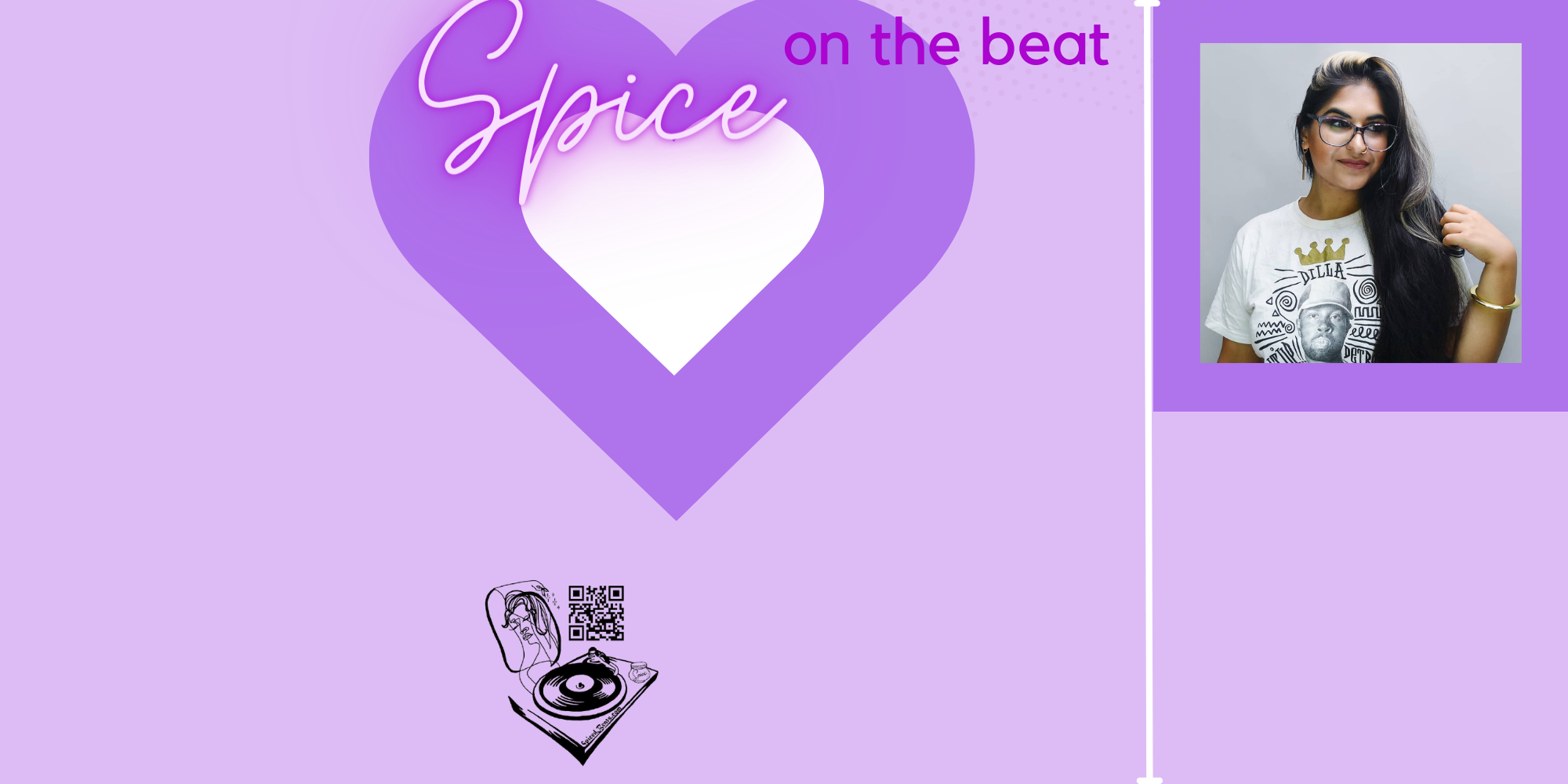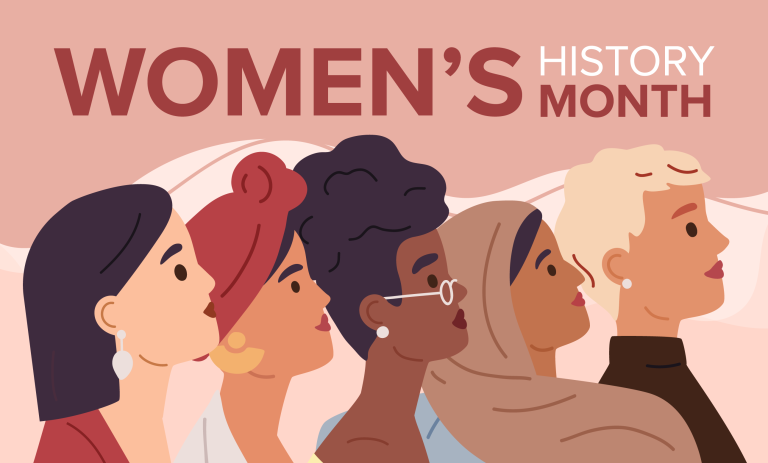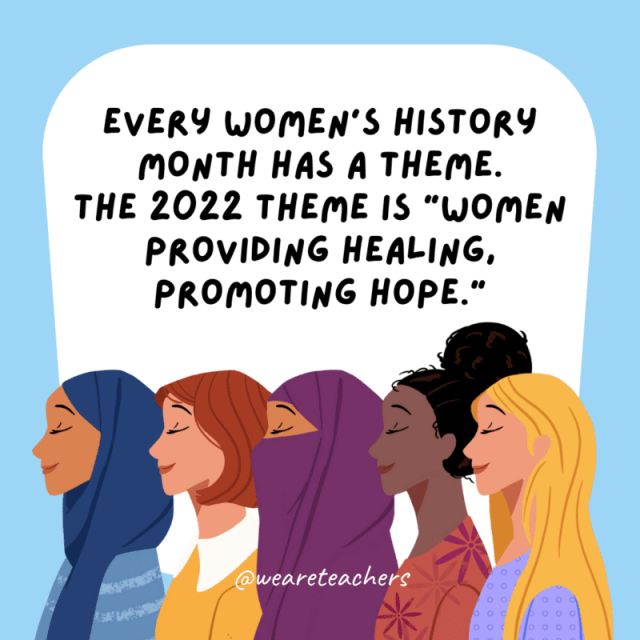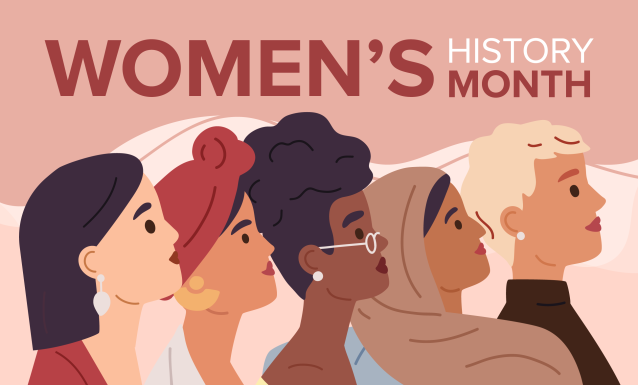One of my favorite things about spending March in Europe was how beautifully they celebrated women on International Women’s Day. As I was leaving my hotel in Lisbon, they gave me a flower and wished me. I even received texts from men I met during my travels. They celebrate the holiday as much as Valentine’s Day, and everywhere you walk, women carry brightly colored flowers they receive while strolling down the street or visiting the grocery store. It was refreshing to experience when, back in the US, we can’t even get fundamental reproductive rights. The least we deserve is one day to celebrate womanhood and all that we do. After this post, I’ll start a petition to let us have that day off from all duties and responsibilities, or at least a paid day off work. Although we don’t have that quite as yet, the thought is there with Women’s History Month. And it’s the idea that counts (sometimes). I love Women’s History Month because it allows us to evaluate all that women have accomplished, especially considering we got fundamental rights not that long ago (and are still fighting for them worldwide). So, in this year’s annual Women’s History Month, we’re going to look at the art of sampling. Not only how women contributed to the craft, but also recognizing some of today’s greatest Hip-Hop songs that wouldn’t be what they are without that feminine touch.
When I first drew up the blueprint for this piece, I was enthusiastic about discovering all of the women who contributed to the art of sampling. However, my discoveries were not at all what I had hoped for. I was expecting to find female inventors and underground artists, but in reality, all I saw were men. Maybe the men were just who was credited. Perhaps the women weren’t allotted the opportunities. I’m still determining. I do know, however, that I was discouraged. Granted, how could I be that surprised? I experience male dominance throughout the industry on the regular. Billboard even released an article two years back stating how underrepresented women are in the music creation process, with an average of only 20% of women placing on the top 100 charts.
Once again, it’s not all that surprising. That said, it is not at all an accurate representation of how influential women have been in music, especially in hip-hop sampling. Just because women weren’t listed as inventors for the Akai MPC didn’t mean they were absent. While the true beginning of sampling is up for debate, it is most widely associated with Hip-Hop culture. One track that utilizes the art of sampling and is considered one of the first Hip-Hop songs is Sugarhill Gang’s “Rapper’s Delight.” The song that goes down in Hip-Hop history would not have been possible without the legendary Disco group Chic’s classic “Good Times.” While the group featured numerous members throughout the years, Norma Jean Wright, Alfa Anderson, and Luci Martin were found right at the front of the stage, lending their vocals to the song that became arguably one of the most essential samples for the creation of Hip-Hop.

Furthermore, many people don’t realize that female Hip-Hop legend Sylvia Robinson produced the song. While Sylvia deserves an article all on her own (maybe next year!), she broke boundaries and records as the first Black female independent record producer to land a top 10 pop song. She later broke another record with “Rapper’s Delight,” becoming the first successful rap record. Later, becoming a well-known label executive among her many other talents, Sylvia Robinson rightfully earned the title of the Godmother of Hip-Hop and is still often overlooked.

J Dilla is arguably one of the most essential names in sampling, although I may be biased because we all know I’m a bit obsessed. When creating the monumental beat for The Pharcyde’s track “Drop,” he borrowed Jazz harpist Dorothy Ashby’s 1962 song, “Django,” to lend elements to the song. Fellow Detroit artist Dorothy Ashby was crowned the first notable jazz harpist, and as expected, she faced a lot of adversity as a Black woman in the music scene. She was known for her trademark bebop style, becoming one of the first artists to incorporate the harp into jazz music. Even with over ten albums and credits for artists including Stevie Wonder, Bill Withers, and Diana Ross, her name was often forgotten when Dilla and other producers revived it by sampling her intricate string sounds.

Wu-Tang Clan constantly paid homage to historical female singers through their production. RZA often looked to Wendy Rene’s works to build up his beats, as demonstrated in the Wu-Tang song “Tearz.” The song features Wendy’s 1964 track, “After Laughter (Comes Tears).” Having received a recording deal at just 16 years old, Wendy Rene earned her stage name from the phenomenal Otis Redding. She was most known for being one of the few singers at the time to only record originally written music.

Nina Simone is an artist whose name holds significant weight in hip-hop. The brilliant artist gets mentioned almost as much as she gets sampled, and her voice is used in all its glory to power through every beat that utilizes it. Nina Simone is among the top 25 artists of all time, with her civil rights activism being the only thing that supersedes her talent. Her music used these strong motifs and topics, making it the perfect fit for revolutionary Hip-Hop sounds. As a global catalog best-seller with over 40 albums of original work, it isn’t easy to pinpoint every single producer that sampled her music. While my absolute favorite is Common’s “Misunderstood,” which features Nina Simone’s haunting live version of “Don’t Let Me Be Misunderstood,” a cover of The Animals’ 1965 song, one of her most popular features is in Kanye West’s “Blood On The Leaves,” which uses her 1965 song, “Strange Fruit.” The dark and gritty song actually borrows Abel Meeropol’s 1937 poem, which recounts the horrifying lynching of African Americans in the South during the Jim Crow era. While many artists offered their renditions, it was Nina Simone’s that stood the test of time.

Some samples tend to get used more than others. For instance, Mos Def and Ayatollah looked to Aretha Franklin’s 1965 song “One Step Ahead” to produce the beat for Ms Fat Booty. But so did several rappers and singers in the last two years. If you ask anyone who’s a Gen Z TikToker, they’ll say JID did it first. And respectfully, while I love JID, that statement makes me want to fight someone. It’s a beautiful piece, though, and if anyone should be sampled an exhausting amount of times, it should be the Queen of Soul and one of Rolling Stone’s Greatest of All Times.

Another Hip-Hop beat you can spot from a mile away belongs to Wu-Tang Clan’s “C.R.E.A.M.” The RZA-produced instrumental is recognizable from the first second, thanks to the female-driven Memphis quartet The Charmel’s 1967 song, “As Long As I’ve Got You.”

It’s hard to imagine that N.W.A.’s “Fuck Tha Police” could have been derived from any other piece of art, but when creating the song, Dr. Dre and Yella incorporated Marva Whitney’s 1969 song “It’s My Thing.” The funk singer, also called Soul Sister #1 thanks to her frequent collaborator James Brown, was mostly known for her song “Chain of Fools,” and can be heard on other pivotal tracks in Hip-Hop like “Let Me Clear My Throat.”

One of the coolest examples of sampling is how DJ Muggs reworked Dusty Springfield’s bluesy 1969 song “Son of a Preacher Man” into Cypress Hill’s “Hits From The Bong.” As one of the most recognized soul singers to come out of the UK, Dusty’s throaty, erotic voice landed her a spot in the Rock and Roll Hall of Fame and among the top 30 greatest female Rock musicians ever. She’s also credited with being the reason for Led Zepplin’s discovery. Dusty was also a notable gay icon ahead of her time, admitting to dating both men and women before it was widely acceptable. When faced with scrutiny, she would claim that everyone wanted to always label her as “gay gay gay” when she “wasn’t anything.”

Now this. This song is like a cool glass of lemonade on a sunny summer day. This is the perfect example of a sample and a beautiful example of womanhood. You have Janet Jackson’s honey-like vocals juxtaposed against Joni Mitchell’s voice in her song “Big Yellow Taxi” to bring us the amazing “Got Til It’s Gone.” And can’t forget the assist from Q-Tip. I’ll always love anything Joni Mitchell because it’s the album Harry gifts Karen in Love Actually. It’s the album Karen sits and cries to because she realizes her husband bought jewelry for another woman and instead gifted her a CD. A magical one at that. It’s the most poetic scene, and I can’t ever help but separate Joni Mitchell’s whimsical voice from it. Can you tell how much I love this song and this movie? The Canadian singer-songwriter and multi-instrumentalist is one of the most influential Folk singers and recipient of the Lifetime Achievement Award.

Rob Base and DJ E-Z Rock’s “It Takes Two” would not be the soulful, energy-packed anthem without the help of Lyn Collins’ “Think (About It).” As another one of James Brown’s proteges, Lyn Collins received a variety of nicknames for her music, from Mama Feelgood to The Female Preacher. As one of James Brown’s camp’s most successful and long-lasting artists, “Think” landed on the Billboard charts, the first before a ten-song run.

This next mention is highly sentimental to me for a few reasons. I wrote a post years ago about Indian influence on Hip-Hop music, and one album I dove deep into was Madlib’s Beat Konducta, Vol. 3 & 4: In India. That album drew influence from different Indian sounds, and one of them is our very own Lata Mangeshkar. The Indian playback singer dedicated her voice to Bollywood cinema for over 70 years, naming her as one of the most influential and greatest singers of the South Asian continent. Having received two of the highest Indian civilian honors and having recorded in over 36 languages, Lata and her sister Asha Bhosle have been credited with uniting countries along South Asian through their music. Madlib sampled her voice in a number of songs throughout his Indian inspired beat projects, including “Movie Finale,” which later turned into Mos Def’s “Auditorium” and featured the song “Do Jhoot Jiye Ek Sach Ke Liye (sad).”

When A Tribe Called Quest made their iconic “Check The Rhime,” they used Minnie Riperton’s 1975 song “Baby, This Love I Have.” While most recognized for her 5-octave vocal range and whistle register which later influenced the voices of artists like Mariah Carey and Ariana Grande, she was also a spokesperson for the American Cancer Society. By 1977, she received the Society Courage Award from President Jimmy Carter. Although her career was cut short due to her early death at 31 years old from cancer, her whistle tone paved the way for record-breaking artists. Additionally, she was the mother to female comedian powerhouse Maya Rudolph.

When Johnny J produced 2Pac’s “All Eyez On Me,” he sampled R&B, Disco, and House singer Linda Clifford’s “Never Gonna Stop.” With numerous tracks sitting on the charts, the Grammy award-winning singer spent a total of 60 weeks on the Billboard Dance Charts throughout her career.

When Stevie J and Diddy incorporated Diana Ross’s “1980 hit “I’m Coming Out” into Biggie’s “Mo Money Mo Problems,” the beat got a life of its own. It’s almost as if it embodied the soulful essence of the Supremes lead singer. With #1 singles all across the Billboard charts, Diana Ross cemented a legacy for herself that spans decades. After working with some of the music industry’s most notorious names and even finding herself in the Guinness Book of World Records, it’s no surprise that she received the Heritage Award for Lifetime Achievement on the Soul Train Awards. She is also the mother to the multi-faceted Tracee Ellis Ross.

Biggie’s notorious samples (hehe) don’t just stop there. The Junior M.A.F.I.A.’s single “Get Money” featured Sylvia Striplin’s 1981 song “You Can’t Turn Me Away.” While the New York jazz and R&B singer’s only album didn’t gain much attention at the time, it’s aged like fine wine, becoming a rarity to acquire for your vinyl collection.

Rashad Smith channeled the lust and sex appeal of Grace Jones in her 1982 song “My Jamaican Guy” to create LL Cool J‘s steamy anthem, “Doin’ It.” Grace Jones continues to be a style and pop culture maverick, excelling in all avenues of the art world, including singing, songwriting, modeling, record producing, and acting. Her countless hit records attracted the eye of Andy Warhol, whom she later became a muse.

You didn’t think I was just going to brush over the fact that I was doing a Women’s History post and NOT hone in on Ms. Janet Jackson when I mentioned her above, did you?! While she’s been sampled quite a few times, her most vivid appearance is on Kendrick Lamar’s “Poetic Justice,” when Scoop DeVille incorporated her 1993 song “Any Time, Any Place.” Kendrick’s song is named after Janet’s movie, Poetic Justice. The rappers who worked with her on that set talked about falling in love with her, and it’s just like, how can you not?! Anyone who only knows Janet as Michael Jackson’s sister is widely mistaken. Janet’s socially conscious lyrics and provocative and sensual nature set her apart and helped her barricade through gender and racial stereotypes. Her incredible dance skills and choreography helped catapult the growth of MTV and even earned her the title of the most erotic performer. Her accolades are far beyond imaginable, spanning from numerous Guinness Book of World Records to a Hollywood Star to being listed in the top 10 of countless lists of all-time bests.

DJ Mark the 45 King’s use of English singer Dido’s 1998 “Thank You” in Eminem’s “Stan” is probably one of the most influential samples of all time. If you’ve ever heard kids say that they stan something, know this is the origin story. And half of them probably don’t even know it. This sample was a surprise, having grown up on Dido. “White Flag” was played regularly throughout our house. But Dido held her own, especially throughout Europe, far before the use of her song. In fact, she was nominated for an Academy Award for a duet she did with my lord and savior, A.R. Rahman, aka THE most influential Indian artist of all time. So that is something no one can match in my eyes. Dido holds the space for some of the best-selling albums in the UK and received the Ivor Novello Award for Outstanding Song Collection from the British Academy of Songwriters, Composers, and Authors.

Lastly, we have the nostalgic “All Falls Down.” Kanye West based the track around Lauryn Hill’s 2002 “Mystery of Iniquity,” but it was denied at the last minute after working to clear the sample using her vocals. Syleena Johnson stepped in to re-record the song, making it what it is today. Lauryn Hill faced a lot of scrutiny in the industry, so some suspect she was painted negatively in this situation when it may have actually had to do with unsettled splits on the album, leaving the decision outside of Lauryn’s control. Either way, the song draws inspiration from one incredible female name in Hip-Hop history, and features the talents of another. Lauryn Hill is considered one of the greatest rappers of all time, surpassing the question of gender. For some reason, in Hip-Hop, that’s a lot harder to do than it may seem, considering all of the phenomenal women rappers that have existed. She is one of the pioneers of my beloved neo-soul, regarded as one of the top 50 artists from Billboard, Rolling Stones, and NPR. Her work with The Fugees helped her become the first woman to win a Grammy Award for Best Rap Album. As she continued with her solo work, The Miseducation of Lauryn Hill made the artist the first female rapper to debut atop the Billboard 200 and receive a diamond certification by the RIAA. Even to this day, it is one of the best-selling albums globally of all time. The RIAA also awarded “Doo Wop (That Thing)” as Song of the Century, and by the 41st Grammy Awards, Lauryn Hill was the first rapper to win Album of the Year and even set the record for the most nominations in one night for any female artist. But her records don’t stop there. She became the first rapper to be featured on the cover of Time, the first rapper to receive a President’s Award from the NAACP, and eventually became certified platinum by the RIAA.

And even then, with all of those celebrations, Lauryn was still failed by the music industry because of its engrained misogyny. Lauryn Hill is arguably one of the most timeless, influential artists of all time, and yet the industry allowed her to be blacklisted and shunned because of a male counterpart. While her career has since returned to the public eye, it’s heart-wrenching that all of these powerful women could create impactful songs that stood the test of time and yet were often failed due to the men they worked with.
Lauryn, Marva, Janet. They all were discarded. While some women are given their flowers, all of them faced obstacles and tribulations that their male counterparts did not, and it still occurs to this day. We constantly hear stories about predatorial figures in the industry. As a woman who has been a part of it for years, I will tell you from first-hand experience that those monsters are not imaginary. As I’ve come into my own, gaining confidence along with my experience, I’ve gotten better at weeding out the false promises and manipulation. But that doesn’t come right away. As this Women’s History Month, I ask of you, especially my male counterparts in the industry, to think about how we can make this industry a safer space for women. What steps can we all take to give women the ability to work and create freely without constantly being on edge about ulterior motives and repercussions? In doing so, we’ll see those statistics rise from 20% to 50% and see more women break barriers and make history.
If you enjoyed this post and are local to the Philadelphia area, please come out to The Trestle Inn Monday, March 25th for a special Women’s History Month Industry Night. You can find me there giving a fun lecture on Women’s History and Hip-Hop, especially diving into the key players and the role of sampling. Emphasis on the fun, I promise! There will be alcohol as well as other amazing women-owned businesses, and entry is free of charge. Hope to see you there♥
If you’d like to support a woman-owned business this March (at no cost!) it would mean the world to me if you would subscribe below and share this post. Don’t hesitate to connect with me on social media (my personal IG is @urfavbrunette) and introduce yourself.







